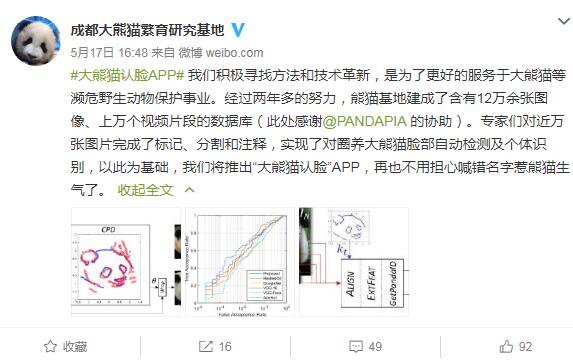

當一群萌萌的大熊貓爬到一起,你還分得清楚誰是誰么?大熊貓擁有黑白相間的皮毛及別具一格的“黑眼圈”,個體之間看起來十分相似,難以區(qū)別。不過愛熊貓人士不用再擔心啦,大熊貓“認臉”APP即將推出,專治熊貓臉盲!

A giant panda eats bamboo at the Beijing Zoo in Beijing, China, May 6, 2019. [Photo/IC]
Having trouble discerning one furry panda from another? A facial recognition app will make it easy for you.
分不清楚毛茸茸的大熊貓?一款面部識別應用程序能讓你輕松分辨。
discern [d?'s??n]:vt.覺察出;識別;了解
The app is developed by the Chengdu Research Base of Giant Panda Breeding along with researchers in Singapore Nanyang Technological university and Sichuan Normal University.
這款應用由成都大熊貓繁育研究基地、新加坡南洋理工大學和四川師范大學的研究人員共同開發(fā)。
“You no longer need to worry about making the pandas angry by calling them by the wrong name,” the Chengdu Research Base of Giant Panda Breeding wrote on Weibo, as it announced its new “giant panda facial recognition” app.
成都大熊貓繁育研究基地在公布這款“大熊貓面部識別”應用時發(fā)布微博稱,“再也不用擔心喊錯名字惹熊貓生氣了。”

Visitors to the panda base in the Sichuan capital of Chengdu, one of China’s top tourist attractions, will be able to scan the panda’s face with the mobile app to get information about that particular bear.
前往該基地參觀的游客只要使用該應用程序掃描熊貓面部,就能獲知每只熊貓的信息。這里是中國最著名的旅游景點之一。
“It’s good news for those with ‘face blindness’ for giant pandas,” the research base said in its statement announcing the breakthrough.
該研究基地在公布這款應用程序的聲明中稱,“這是大熊貓‘臉盲患者’的福音”。
The image analysis research kicked off in 2017. A database now contains about 120,000 images and 10,000 video clips of giant pandas.
這項圖片分析研究在2017年開始,數(shù)據(jù)庫中現(xiàn)有大約12萬張大熊貓圖片和1萬段大熊貓視頻。
Close to 10,000 panda pictures have been analyzed, marked and annotated.
研究人員分析、標記和注釋了將近1萬張大熊貓圖片。
Using the database, researchers are able to carry out automatic facial recognition on panda faces to tell one animal from another, the center said.
研究中心稱,通過使用數(shù)據(jù)庫,研究人員可以對大熊貓的臉部進行自動面部識別,以區(qū)分不同的大熊貓。
It’s not just a gimmick for tourists, though. Researchers say the technology will help them analyze data on pandas both in captivity and the wild.
但這絕非只是為游客們準備的噱頭。研究人員表示,該技術將有助于他們分析圈養(yǎng)和野生大熊貓的數(shù)據(jù)。
gimmick ['g?m?k]:n.暗機關;騙人的玩意;花招

Two pandas are shown at a zoo in Guangzhou, South China's Guangdong province, May 17, 2018. [Photo/IC]
"The app and database will help us gather more precise and well-rounded data on the population, distribution, ages, gender ratio, birth and deaths of wild pandas, who live in deep mountains and are hard to track," said Chen Peng, a researcher with the base who co-authored a paper on "Giant Panda Face Recognition Using Small Database."
論文《基于小數(shù)據(jù)集的大熊貓個體識別》作者之一、成都大熊貓繁育研究基地研究員陳鵬說:“這款應用和數(shù)據(jù)庫將幫助我們收集有關野生大熊貓數(shù)量、分布、 年齡、性別比例、出生和死亡的更準確全面的數(shù)據(jù),它們生活在深山中,很難追蹤。”
"It will definitely help us improve efficiency and effectiveness in conservation and management of the animals," Chen said.
他說:“這款應用必然能幫助我們提高保護和管理大熊貓的效率和有效性。”
China has carried out four scientific field research project of giant pandas in the wild.
中國已經(jīng)開展了四項針對野生大熊貓的科學實地考察項目。
field research:實地調查研究
The number of captive pandas was 548 globally as of November last year. Fewer than 2,000 pandas live in the wild, mostly in the provinces of Sichuan and Shaanxi.
截至去年11月,全球共有548只圈養(yǎng)大熊貓。生活在野外的大熊貓不到2000只,大部分在四川省和陜西省。
Facial recognition technology is widely used in China.
在中國,人臉識別技術已得到廣泛應用。
Police picked a wanted fugitive out of a crowd of 60,000 people at a pop concert in the city of Nanchang last year. In the city of Zhengzhou, billboard-size screens show the faces of jaywalkers.
去年南昌警方在該市觀看演唱會的6萬名觀眾中發(fā)現(xiàn)1名通緝犯。鄭州市則豎起廣告牌大小的顯示屏,曝光亂穿馬路的行人頭像照片。
jaywalker ['d?eiw?:k?]:n.不守交通規(guī)則;亂穿馬路的人
Some public restrooms in Beijing use facial recognition to limit the amount of toilet paper dispensed to each person, while a KFC outlet in Hangzhou has rolled out a “Smile to Pay” system.
北京一些公廁利用該技術限制如廁者取用免費手紙,而杭州一家肯德基餐廳則推出了“微笑支付”服務。